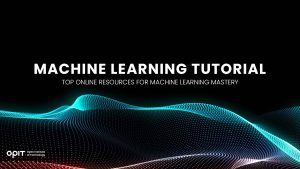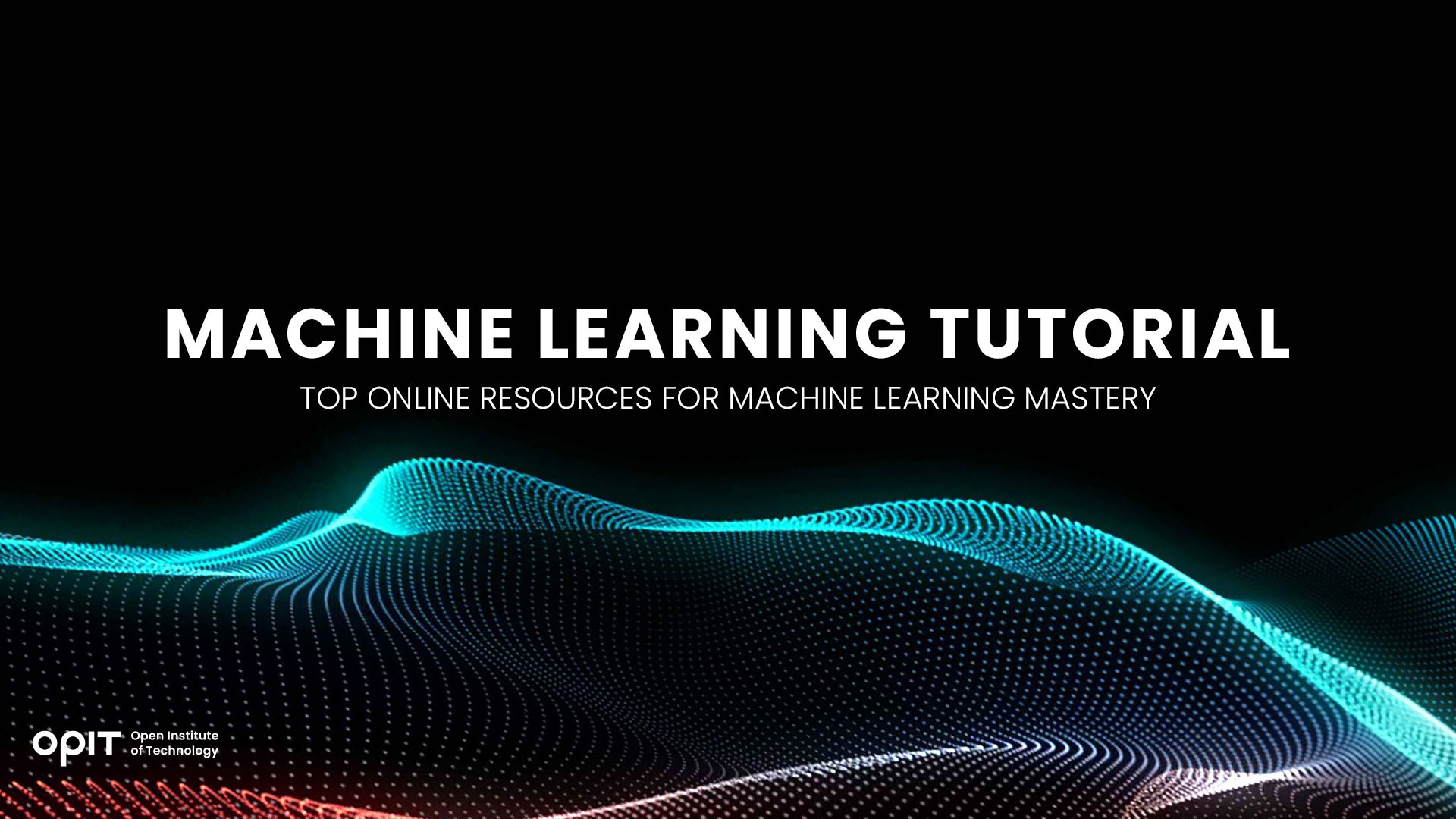

It can often feel like a computer has a “brain,” especially given modern machines’ abilities to run complex calculations and handle instructions. But all of those machines need people behind them to program algorithms and help them to learn based on explicit instructions. That’s where machine learning comes in.
This branch of artificial intelligence brings a machine’s “brain” closer to the real thing than ever before. It’s all about teaching the machine how to do more than simply execute, as machine learning is all about making a machine “think” (based on instructions and algorithms) so it can improve over time. That ability to “think” is crucial in modern business because it gives companies the ability to analyze patterns – both operational and consumer-based – enabling them to make smarter decisions.
But these businesses need people who understand how to create machine learning models. That’s where you come in. With the right machine learning tutorial under your belt, you set yourself up for a career in a field that has only just started to show glimpses of its potential.
The Best Machine Learning Tutorials
Finding the best online tutorial for machine learning isn’t easy given the sheer volume of options available. Analyzing each one based on what it teaches (and how useful it will be to your career) takes time, though you can save yourself that time by checking out the three tutorials highlighted here.
Tutorial 1 – Intro to Machine Learning (Kaggle)
As tempting as it may be to run before you can walk, you need an introduction to the basic concepts of machine learning prior to focusing on more practical applications. Enter Kaggle’s machine learning tutorial. This seven-lesson course takes about three hours of self-guided learning to complete and will leave you with a solid grounding in machine learning that you can take into more industry-focused courses.
The majority of the seven lessons – barring the first – is split into two parts. First comes a tutorial where you’ll learn about the concepts that the lesson introduces, with the second part being an exercise that tests your new skills. Along the way, you’ll learn the basics of how machine learning models work and why you need them to explore large datasets. Other lessons focus on building and validating a model, with the later lessons introducing more complex algorithms, such as random forests, and giving you a chance to test your skills in competitions.
Though this is a beginner-focused tutorial, you’ll need a solid understanding of Python before making a start. Without experience in this programming language, you’ll feel like you’re truly lost in a random forest before you ever get to learn what that term actually means. On the plus side, the tutorial has an active discussion community (which includes the course instructor Dan Becker) that can help you along and point you in the direction of other courses that supplement this one.
Tutorial 2 – Making Developers Awesome at Machine Learning (Machine Learning Mastery)
This machine learning tutorial is less a structured course and more a series of articles and step-by-step instructional lessons that take you from the foundations of machine learning to more advanced concepts. That method of breaking the course into multiple stages is ideal for students of all experience levels. Complete beginners can start with the “Foundations” level and work their way up while those with more experience can dip into specific subjects that give them trouble or will build on their existing skills.
The course is split into four sections – Foundations, Beginner, Intermediate, and Advanced. At the Foundations level, you’ll learn about the statistical concepts and models that underpin machine learning, giving you a solid basis to move into the Python programming taught in the Beginner section. Once you have a grasp of Python, the Intermediate section teaches you about deep learning and how to code machine learning algorithms. By the time you hit the Advanced stage, you’ll be working on complex subjects like computer vision and natural language processing.
With its less structured nature, this tutorial is great for people who want to dip in and out and those who need to hone in on a specific aspect of machine learning. It’s also a good choice for beginners because it covers practically everything you’ll need to know. Unfortunately, the lack of structure means you don’t get an official certification from the tutorial. Some students may also not like the “hub” nature of the tutorial, as it links you to tons of different web pages that can lead to confusion over time.
Tutorial 3 – Machine Learning Crash Course With TensorFlow APIs (Google)
If you already have a mathematical foundation (as well as some basic understanding of machine learning), Google’s tutorial helps you take your skills to the next level. You’ll need to understand algebra, statistics, and basic trigonometry, in addition to having some understanding of Python, to get started. But assuming you have all of that, this machine learning tutorial exposes you to real-world examples of the technology in action.
It’s a 25-lesson course that contains 30 exercises covering topics like model development and testing, data representation, and building neural networks. According to Google, it takes about 15 hours of self-guided study to complete, though your time may vary depending on how much you already know before you start the course.
The biggest advantage of this tutorial is the name attached to it. Google is a major player in the tech industry and the presence of its name on your CV instantly shows employers that you know your stuff. The course material is also delivered by lecturers who work at or for Google, allowing them to bring their real-world experiences into their lessons. On the downside, the tutorial’s prerequisites make it unsuitable for beginners, though Google does offer more basic courses (both in machine learning and Python) to help you build the required foundation.
Factors to Consider When Choosing a Machine Learning Tutorial
The three options presented above all make a solid case for the best online tutorial for machine learning, though each offers something different based on your current skill level. To make the best choice between the three (and any other tutorials you find) you should consider these factors before committing yourself.
Your Current Skill Level
Diving into neural networks before you even know how machine learning works is like trying to row upstream without a paddle. You’re going to get stuck in rough waters and the end result won’t be what you want it to be. Be honest with yourself about your current skill level to ensure you don’t start a tutorial that’s too difficult (or too simple) for your abilities.
Programming Languages
There’s no getting away from the fact that you’ll need to feel comfortable with programming before taking a machine learning tutorial. Specifically, you’re likely to need some knowledge of Python, though how much depends on the course you take. Other languages can help, at least in the sense of ensuring you’re familiar with programming, but you need to check the language the course uses before starting.
Specific Topics
Though the basic idea of building a machine “brain” is simple enough to understand, the machine learning waters run deep. There are tons of topics and potential specializations you could study, and not all are useful for your intended career path. Check what the course covers and ensure those topics align with what you hope to achieve once you’ve completed the tutorial.
Time Commitment
If a tutorial takes an hour or two to complete, you don’t really need to worry about how you’ll fit it around your other commitments. But if it takes you down a machine learning rabbit hole (i.e., the Machine Learning Mastery Course), you need to get serious with scheduling. Figure out how much time you can commit to your course per week and choose a tutorial that fits around your commitments.
The Cost
On the plus side, many machine learning tutorials are available free of charge. But if you’re looking for more official certification, or you want to take a more formal course, you’ll usually have to pay for the privilege. Weigh up the course’s cost against the benefit you get out of the backend.
Tips for Getting the Most Out of a Machine Learning Tutorial
Anybody can start a machine learning tutorial, but only the truly committed will complete and actually get the most out of the materials. Follow these tips to ensure you’re spending your time wisely on the tutorial you choose:
- Set clear goals from the outset that define what you want to achieve with the tutorial and where it’s supposed to lead you.
- Dedicate time to learning every week because regularity is the key to making the information you absorb stick in your mind.
- Engage with any communities related to your tutorial to learn from your peers and ask questions about the tutorial’s content.
- Apply what you learn to real-world problems, either via the course itself or by searching for examples of what you’ve learned being put into action.
- Update your knowledge and skills regularly with further tutorials because what you learn today may be out of date tomorrow.
Find the Best Online Tutorial for Machine Learning for You
There is no single “best” machine learning tutorial on the web because each approaches the subject differently. Some assume you have no knowledge at all and will start with basics before moving you into deeper subjects. Others require you to understand the computing concepts (mathematical and programmatical) that underpin machine learning before you can get started. Understand what the course offers, and what it needs from you, before you get started.
Regardless of your choice, getting started is the most important thing you can do. Once you’ve chosen a tutorial, commit yourself to it fully to take your first step (or potentially a giant leap) into a career that’s only going to grow as machine learning models become more common in business.
Have questions?
Visit our FAQ page or get in touch with us!
Write us at +39 335 576 0263
Get in touch at hello@opit.com
Talk to one of our Study Advisors
We are international
We can speak in:




